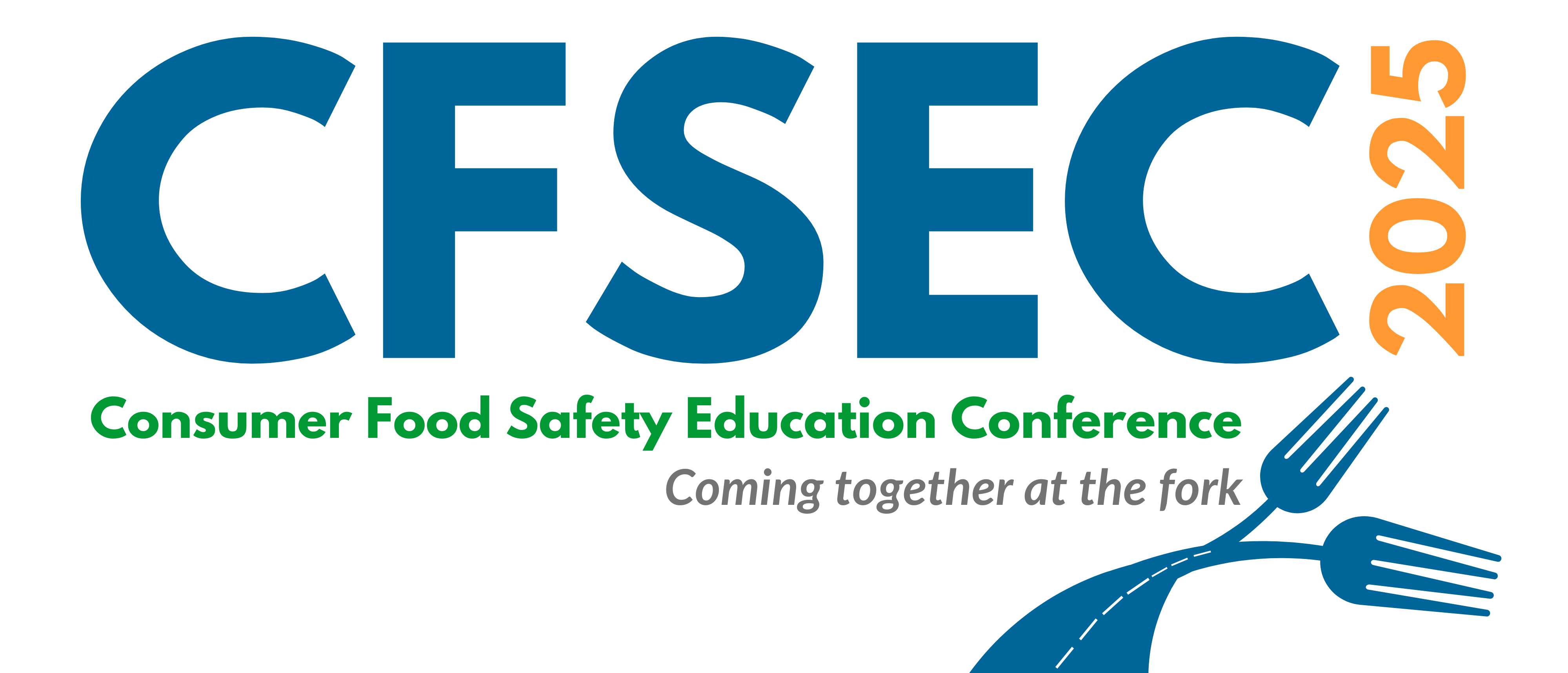More details coming soon. Sign up for our e-newsletter to stay up-to-date on all conference information!
In the meantime, browse the poster sessions from the 2023 Consumer Food Safety Education Conference below:
2023 Poster Sessions
Posters will be available for viewing and presenters available for questions during the Poster Reception on Thursday, March 2 from 4:30 to 6 p.m.
Food Safety Education Campaigns: Should We Include Raw Meat-Based Diets for Pets in the Equation?
Providing raw meat-based diets to pets poses additional food safety risks to pet owners due to handling and storage of raw meat products. This study investigated pet owner motivations, food safety perceptions and practices in the UK and Slovenia to inform future educational campaigns.
Dr. Ellen W. Evans, ZERO2FIVE Food and Drink Research Unit, Cardiff Metropolitan University
Use of the ‘Safe Recipe Style Guide’ to Review Food Safety Information Provision in Online Recipe Videos and Online Supermarket Recipes
The way consumers obtain recipes has changed dramatically due to changes in mobile technology. The study utilised the PFSE Safe Recipe Style Guide, to evaluated the inclusion of key food safety practices in online video-based and text-based ‘chicken salad’ recipes.
Dr. Ellen W. Evans, ZERO2FIVE Food and Drink Research Unit, Cardiff Metropolitan University
‘Safe Recipe Style Guide’ and the Evaluation of UK Meal-Kit Recipe Cards
The Partnership of Food Safety Education’s (PFSE) ‘Safe Recipe Style Guide’ highlights key food safety principles required for the consumer when following a recipe, and the database tool was modelled after the guidance for the evaluation of meal-kit recipe cards.
Dr. Ellen W. Evans, ZERO2FIVE Food and Drink Research Unit, Cardiff Metropolitan University; Naomi Melville, ZERO2FIVE Food and Drink Research Unit, Cardiff Metropolitan University
Food Safety for Events: Meeting the Needs of Other Food Handlers in Iowa
This outreach training program provides food safety training to food handlers that need food safety knowledge but do not need certification for handling food.
Holly VanHeel and Jill Weber, Iowa State University Extension
HACCP Bootcamp: A Food Safety Training Provided by Iowa State University Extension and Outreach for School Foodservice Workers During the COVID-19 Pandemic
This outreach program aimed to provide training on HACCP to school foodservice personnel during the COVID-19 pandemic.
Renee Sweers, Iowa State University Extension
Food Safety Education Strategies and Successes! Collaborative Partnerships between Extension and Public Health
Partnerships between public health entities and Extension’s outreach education networks can combine complementary and supportive strengths to address critical food safety needs in our communities. Three examples of successful public health and university Extension collaboration in Colorado will be shared along with benefits associated with building a stronger outreach network.
Dr. Marisa Bunning, Colorado State University Extension
Illuminating Agricultural Extension and Education Career Opportunities for STEM and Liberal Arts Undergraduate Students
This project aims to illuminate career opportunities for students at two land-grant universities in the Appalachian region of the United States. Trained students deliver leadership, food safety, food preparation, and food preservation programs under the mentorship of university faculty and Extension Agents in Appalachia and Senegal.
Dr. Lester Schonberger, Virginia Tech
Integrating Food Safety Education into RDN Food Science and Menu Planning Curriculum
Like all health and food safety educators, dietitians know that food safety practices are critical for preventing foodborne illnesses. Nevertheless, are educators sharing these practices at every opportunity? This poster demonstrates how students are taught to integrate food safety education into a key component of consumer nutrition.
Tara Kelly, MS, RDN, The University of Alabama at Birmingham
Safe Food Handling Saves Lives
A collaboration between two Family & Consumer Sciences Agents, a restaurant owner, and the local health inspector to provide extra food safety training for employees in management positions yields fantastic results.
Susan Moore, University of Georgia Extension; La Keshia Levi, University of Georgia Extension
Cottage Foods Training–Encouraging Food Safety One Cupcake at a Time!
With the increase in the cottage food industry, there is an increased need for targeted food safety training for producers. Learn the why’s and what’s about creating a state specific cottage food class, and its positive multiplier effect for educators.
Cindy Brison, RDN, University of Nebraska Extension; Nancy Urbanec, University of Nebraska Extension
Communicating Safe Food Handling Practices for Thanksgiving
The U.S. Department of Agriculture’s Food Safety and Inspection Service (USDA FSIS) equipped consumers with science-based food safety best practices in English and Spanish during the biggest food holiday of the year, Thanksgiving. Learn about communications elements that were used to formulate a successful educational campaign that generated over 5.5 million impressions and views.
Meredith Carothers, Food Safety and Inspection Service, U.S. Department of Agriculture
Oral Culture Learning Project — A Hands-On Approach to Teaching Food Safety and Proven Results
Boulder County Public Health (BCPH) has changed its food safety teaching methods with Oral Culture Leaning (OCL) for food handlers. Learn the differences between the standard food safety class and the OCL classes. BCPH will demonstrate how OCL encourages participants to engage during class making it easier to learn.
Rosa Stillwell, Boulder Country Public Health
The CSCC for Diabetes
To illustrate clean, separate, cook and chill, reels will be presented in a video format. Participants will be invited to evaluate whether the digital tool (s) improve decision making on best food safety practices for individuals with diabetes. This research highlights the four steps to food safety for individuals diagnosed with diabetes.
Iris McDuffie MS, RDN, LD, FNKF, Nutrition IAM, LLC
Understanding the Needs of Food Safety Educators Through a Nationwide Needs Assessment
What are the needs of today’s health and food safety educators? What resources do they need to be equipped with in order to reach communities with vital safe food handling information? A survey of 570 health and food safety educators from across the country was conducted by the Partnership for Food Safety Education to answer these questions and more.
Chinwendu Ilonzo, MPH, CPH, Graduate Student, University of South Florida; Evaluation Fellow, Partnership for Food Safety Education
